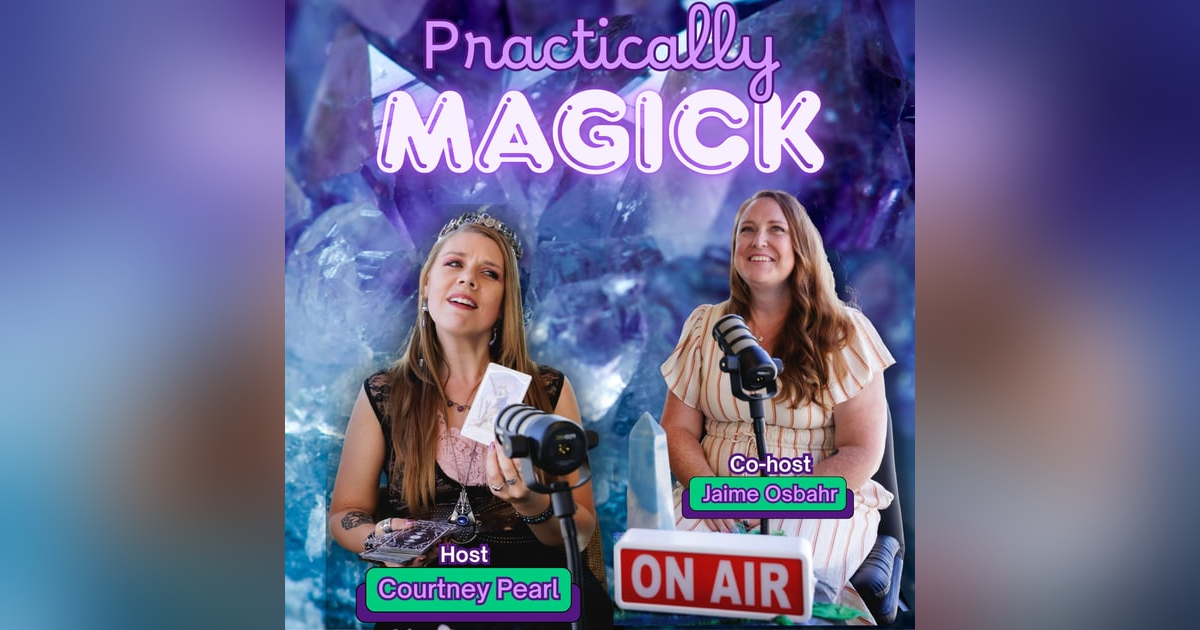Morning Pages: Unlock Your Creative Potential Through Free Writing
Welcome to the Practically Magick blog! In this post, we're diving deep into the practice of morning pages, a powerful tool for unlocking your creative potential and accessing your inner voice. Inspired by Julia Cameron's seminal work, 'The Artist's Way,' morning pages offer a pathway to clear mental clutter, foster self-discovery, and spark innovative ideas. Whether you're a seasoned artist, a struggling writer, or simply someone seeking personal growth, this daily practice can revolutionize your life. And if you're interested in hearing more about the power of words, be sure to check out my latest podcast episode, The Magick of Words: How to Use Language to Manifest Your Desires. In this episode, I explore how language shapes our reality and how you can use it to manifest your dreams, touching on the power of morning pages as a creativity-boosting tool. Let's explore the magic of morning pages!
What are Morning Pages?
At its core, morning pages are a simple yet profound exercise: three pages of longhand, stream-of-consciousness writing, done first thing in the morning. The content doesn't matter. There's no need to be eloquent, grammatically correct, or even coherent. The point is simply to get your thoughts onto paper, releasing the mental chatter that clutters your mind and stifles your creativity.
Think of it as a mental detox. Throughout the day, we accumulate a build-up of thoughts, worries, anxieties, and distractions. These can create a block that prevents us from accessing our deeper creativity and intuition. Morning pages act as a release valve, allowing these pent-up thoughts to flow out, leaving you feeling clearer, calmer, and more open to inspiration.
The beauty of morning pages lies in their lack of pressure. There's no judgment, no audience, and no expectation. You're writing purely for yourself, allowing your thoughts to wander wherever they may. This freedom is key to unlocking the subconscious mind, where hidden gems of creativity and insight often reside.
The Artist's Way Connection
The concept of morning pages was popularized by Julia Cameron in her book, 'The Artist's Way: A Spiritual Path to Higher Creativity.' Cameron presents morning pages as one of the two core tools for recovering and nurturing your creative self, the other being "artist dates". She believes that everyone is inherently creative but that many of us have been blocked by limiting beliefs, negative experiences, and self-doubt.
In 'The Artist's Way,' morning pages are framed as a way to "bypass the censor," the internal critic that constantly judges and suppresses our creative impulses. By writing freely and without judgment, we can access a deeper level of consciousness, where our true creative potential lies. Cameron encourages readers to approach morning pages with a sense of playfulness and curiosity, rather than pressure or expectation.
Cameron emphasizes the importance of consistency. She recommends writing morning pages every day, even when you don't feel like it. The cumulative effect of this daily practice is transformative. Over time, you'll notice a shift in your mindset, a greater sense of self-awareness, and a newfound confidence in your creative abilities. It is about establishing a ritual that helps to strengthen the creative muscles that we all have inside.
Benefits of Morning Pages
The benefits of practicing morning pages extend far beyond simply unlocking creativity. This daily exercise can have a profound impact on various aspects of your life, including:
Reduced Stress and Anxiety
By releasing the mental clutter that accumulates throughout the day, morning pages can help to reduce stress and anxiety. Writing down your worries and anxieties allows you to process them in a healthy way, preventing them from festering and overwhelming you. It can be very therapeutic to just write down the constant negative thoughts that seem to plague us.
Improved Clarity and Focus
Morning pages can help you gain clarity and focus by clearing your mind of distractions. Once you've released your thoughts onto paper, you'll find it easier to concentrate on the tasks at hand. It also helps you to prioritize what is important to you.
Enhanced Self-Awareness
As you write freely and without judgment, you'll gain a deeper understanding of your thoughts, feelings, and motivations. Morning pages can help you to identify patterns in your thinking and behavior, leading to greater self-awareness and personal growth.
Increased Creativity and Inspiration
By bypassing the censor and accessing your subconscious mind, morning pages can spark creativity and inspiration. You may find that new ideas and insights emerge as you write, leading to breakthroughs in your creative projects.
Improved Problem-Solving Skills
Morning pages can help you to approach problems with a fresh perspective. By writing about your challenges, you can gain a new understanding of them and identify potential solutions. Often times by writing down our problems we can come to better solutions.
Boosted Self-Confidence
As you witness your own thoughts and ideas taking shape on paper, you'll gain a greater sense of self-confidence. You'll realize that you have valuable insights to offer and that your voice matters. This helps you build your confidence in your own skills and abilities.
How to Practice Morning Pages
Practicing morning pages is simple, but consistency is key. Here's a step-by-step guide to get you started:
- Set aside time: Allocate 20-30 minutes each morning for writing your pages. It's best to do this before you check your phone, email, or engage in any other distractions.
- Gather your materials: You'll need a notebook or journal and a pen. It's important to write longhand, as this allows for a more direct connection between your thoughts and your hand.
- Start writing: Begin writing whatever comes to mind. Don't worry about grammar, spelling, or coherence. Just let your thoughts flow freely onto the page.
- Fill three pages: Aim to fill three pages each day. This may seem like a lot at first, but you'll find that the words start to flow more easily as you continue writing.
- Don't censor yourself: The most important rule of morning pages is to not censor yourself. Write whatever comes to mind, even if it's negative, embarrassing, or nonsensical.
- Don't reread: Once you've finished writing your pages, don't reread them. The purpose of morning pages is to release your thoughts, not to analyze or judge them.
Remember, there's no right or wrong way to do morning pages. Experiment with different approaches and find what works best for you. The key is to be consistent and to approach the practice with a sense of openness and curiosity.
Morning Pages vs. Gratitude Journals
While both morning pages and gratitude journals are valuable writing practices, they serve different purposes. Morning pages are about releasing your thoughts and clearing your mind, while gratitude journals are about focusing on the positive aspects of your life.
In a gratitude journal, you typically write down a list of things you're grateful for each day. This practice can help to shift your focus from negativity to positivity, boosting your mood and overall well-being. Gratitude journals are a great way to start or end the day on a positive note.
Morning pages, on the other hand, allow you to explore a wider range of emotions and thoughts. You can write about your worries, anxieties, frustrations, and even your anger. This can be a more cathartic and therapeutic practice than simply focusing on the positive.
Both practices can be beneficial, and you may find that incorporating both into your daily routine is a powerful way to support your mental and emotional well-being. As mentioned in my podcast episode, "The Magick of Words: How to Use Language to Manifest Your Desires," keeping a gratitude journal can be particularly beneficial right before bed, promoting relaxation and improving sleep quality.
Morning Pages and Manifestation
While morning pages are not explicitly a manifestation technique, they can indirectly support your manifestation efforts. By clearing your mind of limiting beliefs and negative thoughts, you create space for positive affirmations and intentions to take root.
When you're clear about what you want to manifest, you can use morning pages as a way to explore your desires and identify any potential obstacles that may be hindering your progress. You can also use morning pages to visualize your desired outcomes and write as if you've already achieved your goals.
The act of writing can be a powerful way to solidify your intentions and align your thoughts, feelings, and actions with your desired outcomes. Morning pages can help you to tap into your subconscious mind, where your beliefs and desires are deeply ingrained, allowing you to reprogram any limiting beliefs and create a more positive and empowering mindset.
By freeing your mind of any mental road blocks, morning pages helps clear the path to better manifesting.
Overcoming Challenges and Staying Consistent
Like any new habit, practicing morning pages can be challenging at first. You may find it difficult to make time for it in your busy schedule, or you may struggle to fill three pages each day. Here are some tips for overcoming these challenges and staying consistent:
- Start small: If filling three pages seems daunting, start with just one or two pages and gradually increase the amount as you become more comfortable with the practice.
- Schedule it in: Treat morning pages like any other important appointment and schedule it into your day. This will help you to prioritize it and make it a non-negotiable part of your routine.
- Prepare in advance: Have your notebook and pen ready the night before, so you can easily start writing as soon as you wake up.
- Be patient: It takes time to develop a new habit. Don't get discouraged if you miss a day or two. Just pick up where you left off and keep going.
- Find an accountability partner: Connect with a friend or family member who is also interested in practicing morning pages and support each other in staying consistent.
- Adjust as needed: If you find that morning pages aren't working for you, don't be afraid to adjust the practice to fit your needs. You can experiment with different times of day, different writing prompts, or different lengths of time.
Remember, the key is to find a way to make morning pages a sustainable part of your daily routine. With patience and persistence, you'll reap the many benefits of this transformative practice.
Conclusion: Unlock Your Creative Potential
Morning pages are a powerful tool for unlocking your creative potential, clearing your mind, and fostering self-discovery. By dedicating just a few minutes each day to this simple writing practice, you can experience a profound shift in your mindset, a greater sense of self-awareness, and a newfound confidence in your creative abilities. So, grab a notebook and a pen, and start writing your way to a more creative and fulfilling life. And don't forget to listen to my latest podcast episode, The Magick of Words: How to Use Language to Manifest Your Desires, to further explore the power of language and how you can use it to manifest your dreams, just like we use morning pages to manifest a more creative you!











